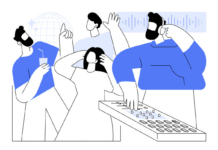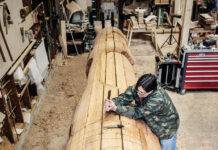By David Lennam
Kuba Oms races east at high altitude tapping his fingers to some cerebral beat. The Victoria-born singer-songwriter, and longtime frontman for seminal funksters Velvet, is jetting to Montreal to collaborate with Sultan and Ned Shepard.
The internationally renowned DJ/producer duo has tapped him to put the vocal to their latest backing tracks. The result, hopes the confident Oms, is a tune that packs dance floors from Sidney to Serbia.
“I’m flying to Montreal to write a hit.”
The matter-of-fact way he says it catches you off guard. Oms isn’t being arrogant; he’s being businesslike — a mix of cojones and acumen that can determine the bankability of an artist. Even one shuttered away in the musical suburbs of Victoria.
“You don’t have to live in New York anymore to make it,” explains Oms. The Internet has connected the dots for singers and bands anywhere on the planet, allowing them to live and work at home while generating worldwide buzz. “You have a global marketplace at your fingertips, literally. You can sell your music to someone in Iran instantly. You can broadcast your videos, your studio sessions, your interviews on the
Internet for free. These are tools that didn’t exist a few years ago.”
Oms is Exhibit A with a hot solo album and a song in a Jessica Biel movie. His name on Billboard’s Hot 100 means he won’t have to smuggle the band under a blanket in the back of a van next time he boards the ferry, just like those days on tour with Out of Nowhere, Souled Out, or Velvet.
Making a living for musicians in Victoria isn’t fantasy… just unlikely.
According to LiveVictoria.com, the authoritative website for working musicians, the city boasts about 330 bands and solo performers currently available to book shows.
The dream of riches starts by finding somewhere to perform, and there’s steep competition for 30 or so bars, pubs, restaurants, hotel lounges, and coffee shops that regularly pay musicians. There are at least another dozen halls and spaces for bands to rent and put on their own shows — rooms as diverse as Sugar, Alix Goolden Hall, or the Victoria Event Centre.
For the businesslike musician, there are limitless possibilities. The music world has no salary cap. One hit single, for example, can create 5,000 to 50,000 radio “spins.” Each spin generates $3 to $4 per, with the cash going to the writer and the song publisher. A good hit, notes Michael Burke, founder of Victoria-based Cordova Bay Records, is in the 20,000-spin range, generating about $80,000.
“The point is,” says Burke, “you can get by as a Canadian artist, but barely. To make real money you need to have a hit outside the country.”
Those lacking the alchemical skills to turn four chords and a clever hook into Junos and Grammys, call them the majority, more often seek out fame and fortune with a road map and a full tank of gas. Consider a sampling of the talent Victoria has produced: Nelly Furtado, David Foster, Hot Hot Heat, Bob Rock, Ian Tyson, Uriah Heep’s Bernie Shaw, the Dayglo Abortions. All those pins in the map of our vibrant, but relatively unsung, music scene were pulled out when each of them left to find a paycheque. There’s the old saw about Canadians having to go south to prove themselves. Is it that way for Victoria musicians? Or do changes in technology mean homegrown successes can remain at home?
DON’T QUIT YOUR DAY JOB
For Tyson Yerex that’s debatable. The 31-year-old veteran of two successful local bands — Moneyshot and Acres of Lions — says you can remain on the Island, but keep your gear packed and your van gassed up. “You really need to get out on the road and make something memorable.”
Cordova Bay signed Acres of Lions last year and immediately sent them off in a van. When you’re starting out, a gig might be worth $200 — in total, says Yerex, and that money covers expenses and is shared with bandmates.
“A hundred dollars of gas in our van drives us five hours,” he calculates. “If you’re getting paid $200 for a show, you’d better not have to drive more than 10 hours, and you’d better not have to get a hotel.”
When the van is parked, it’s back to the reality of nine-to-fiving. “Everybody in the band has a day job,” sighs Yerex, a computer programmer. “At this point, that’s a must. For us, it’s still scraping by and figuring how we take another six weeks off work and having our boss let us come back after that.”
After 13 years of trying to quit his day job, singer-songwriter James Kasper has seen things grow so lean that he’s moving to Saskatchewan to pursue a career in broadcasting. “There was a period a few years ago where I actually paid my rent with music,” he says. “That was pretty surprising.”
Kasper was once king of the open mic, advisor to dozens of emerging singers and founder of an upstart record label. In 2002, his own recording career in full swing, he initiated a six-year run of the Island Music Awards, providing national exposure for local talent and strengthening an already tight musical community.
The IMAs ended up attracting names like Terry David Mulligan, Nanaimo blues guitarist David Gogo, 54-40’s Neil Osborne, and Will Millar of the Irish Rovers but became more headache than headline. Sponsorship money was elusive. Kasper bailed. The awards disappeared.
“The amount I was investing was far outweighing the amount I felt I was getting out of it,” he laments.
Even someone as respected as Kia Kadiri has to have a second job. The longtime Victorian, back home now after seven years in Vancouver, has taken numerous sabbaticals from a managerial position at Starbucks to achieve upper echelon status in Canadian hip-hop. But it has come at a price. The long and winding road of the road — clubs, halls, festivals, the occasional arena — has forced her to abandon everything else, including starting a family. Tour like a fiend or the music business will be more about scraping together rent than negotiating record deals. And those deals are more about short-term relief than early retirement sitting on the deck of a yacht.
HIT THE ROAD, JACK
The isolation factor of living on an Island on the edge of a country well known for letting its talent escape can be ruinous for career-minded musicians. “Nobody knows they’re here,” says Burke, addressing the “hidden” nature of Victoria’s vast musical talent pool — one that feeds into every genre.
The record company boss says, per capita, the Island probably boasts more great musicians than anywhere else in the nation. The ones who are making it will tell you it’s possible to make it. The others tend to whine about their luck. Burke gives the whiners this advice: “If you actually are prepared, you have a lot of luck.” Victoria bands newly signed to Cordova Bay, like Vince Vaccaro and Acres of Lions, are having just that.
A record company not only provides money, exposure, and status but also a team of professionals. Unsigned acts have to book their own shows, make their own posters, hound radio stations for airplay, and schlep their own gear (OK, even most of the signed ones have to do that), but for Acres of Lions, a contract has meant having connections made and gigs booked. It just hasn’t meant a pile of riches… yet. The band makes limited revenue from record sales and music publishing, but they actually make more from live performances and sales of merchandise. Burke estimates Acres of Lions generates upwards of $100,000 a year. But after paying management fees, travel costs, living expenses, money for new gear, then splitting the leftover four ways, it’s like minimum wage.
At the pinnacle of Canadian music success in the 1980s, Ivan Doroschuk’s deep, rolling voice led pop-rockers Men Without Hats to the top of the charts with songs like The Safety Dance and Pop Goes the World. The 52-year-old h
as since settled down to raise a family in Victoria and recently started mentoring singer/songwriter Andre Bell. One of the things he’s impressed upon his 23-year-old protégé is that Victoria is a great place to begin or to end up. It’s just not the place where you can make it.
“You’ve always got to leave home. It doesn’t matter where you’re from,” says Doroschuk. “Even Men Without Hats, we’d tour all over the world, but when we came home to Montreal, people wouldn’t give us the time
of day.”
That’s not lost on Bell, who mentions a recent gig by the local Immaculate Machine, who couldn’t quite fill tiny Logan’s Tavern after high-profile gigs in Toronto and New York.
Asked whether he’d do it differently if Men Without Hats were today a young band starting out in Victoria, Doroschuk doesn’t even blink. “Same thing I did in Montreal. Pack up all my gear in a van and start touring.”
THE GUY WHO GOT OUT OF TOWN AND THE GIRL WHO WILL
These days, Michael Kaeshammer lives in Toronto and tours internationally, but the jazz pianist and singer recalls abundant gigging back when he was a teen prodigy starting out in Victoria. “I was really busy while I was here. Victoria is a good place to start, but people in the music scene told me to move. ‘You should go to Vancouver,’ they said.”
He did, but Kaeshammer’s advice is skip Vancouver and maybe even skip Toronto. “Go to New York. Why waste time in between?”
Emily Braden was listening. The 27-year-old jazz vocalist, with the big delivery and trademark Ella scatting, is moving to New York.
For jazz musicians, particularly, Victoria isn’t where you hit your stride. It’s even hit and miss putting on a show. A performance at the Victoria Event Centre with Braden’s band The Deepdowns didn’t make a cent, despite the fact world-class guitarist Marc Atkinson sat in. Booking the 250-seat downtown hall cost Braden $780 for the night, plus a $15-an-hour fee that covers a room manager. Although the VEC provides a PA system, Braden rented her own gear for $300. Advertising costs were about $300 as well, for a total of almost $1,500. About 160 people bought tickets, which gave the four-member Deepdowns nearly $2,400, plus 20 per cent of what was sold at the bar that night.
“The frustrating reality is when you do choose to take a little risk it often fails. You book a big show once a month in one of the two venues you’re able to do that in, then what do you do, play in a café?”
Charlene Birbeck moved here from Hamilton four years ago after studying jazz. She has used regular, solo café gigs to finance larger shows with a full band, but explains it’s a losing battle. “There’s no money to be made here at all,” she says. “The venues, the promoters… everybody is in it for themselves, which is understandable. It’s a business.”
Survival means playing cover songs in a pub for up to $500 a night. Do your own tunes and you make less than $100, if anything. Venues that book original artists are rare. If they do, they’re taking their cut of the door. Recently, Birbeck sold out a 200-seat venue for $6 a head, which sounds great until you consider that she split the bill with two other bands, then paid the hall rental, door person, insurance, and advertising, leaving perhaps $50 in her pocket for a night’s work.
A consistent gripe from musicians is that bar managers don’t want to pay for a performer, but it may be a case of supply and demand dictating the market. For a decade, Lucky Bar manager Liam Lux has made the local scene as DJ, promoter, booking agent, and spokesman for the Victoria Bar and Cabaret Association. He refers to the scene as one “strangled by a culture of discouragement endemic in Victoria” and is puzzled by the fickle nature of live music fans.
“People simply don’t have the mentality that if they want something to succeed, they need to participate,” he says. “If they like a band, they need to go see the band or that band doesn’t get to play anymore.”
THE NEW MUSIC
Twitter, Facebook, MySpace, and YouTube are the new flyers handed out on a street corner. Web-based social media is vital to selling out concerts and selling songs. Braden sold out a concert at Hermann’s entirely through Facebook —150 tickets at $15 per. Without having to pay for advertising, she took home $800 after paying her musicians $200 apiece.
Nick Blasko, who promotes bands and shows in Victoria through his nine-year-old Atomique Productions, has a 6,000-name e-mail list. “We announce something and we can gauge the activity quickly to see how it’s going to do.”
Then there’s the story about a young Vancouver songstress who turned a chance meeting with one of the stars of the Twilight films into a career move. She Twittered about it and within 24 hours was featured in newspapers from New York and L.A. One of her songs posted on MySpace went from 5,000 hits to 50,000 in the space of a click.
“I sold a ton of MP3s in Japan through iTunes,” says Birbeck. The artist gets 66 cents from every 99-cent downloaded track and an additional two to three cents if someone logs on and listens to the song without buying it.
Kadiri makes way more money from having an album’s worth of songs on the soundtrack of TV’s The L Word than she does on the radio. The TV deal means a regular stream of $1,500 cheques arrive from SOCAN, the national body that keeps track of royalty payments to songwriters. “If you can get your music into some licensing program, commercials, or a movie or a video game, that’s where you can get money,” is her advice.
If a label doesn’t represent you, you’re an indy act. You wear a lot of hats and learn how to wear them properly. Birbeck has a college diploma in jazz voice, but her studies never covered the business side. “I’ve had to figure out how to advertise, use Photoshop, book tours, do postering, make videos, organize my fans, do my own website. And that’s on top of practising and playing. They never taught me that at school.”
TAKING CARE OF BUSINESS
Radio has always been, and remains, the tent peg for bands on the rise. Despite the fractured state of contemporary music, getting a song on the dial can still turn garage bands into arena-fillers.
Victoria’s The Zone, sister station to longtime local music supporters Q-100.3, has found magic with its Band of the Month contest, allowing local acts space on the airwaves. But it’s competitive. The station regularly has 50 or more bands shortlisted.
“Music is a sea and your band is a teacup,” says The Zone’s music director Dave Sawchuk, admitting that he’s impressed by the maturity of bands today. But their reliance on the web, he cautions, might not have them thinking about getting on the radio. And they should be. The Band of the Month has established Victoria products like The Armchair Cynics, Vince Vaccaro, Jets Overhead, and Acres of Lions the same way The Q’s Rocktoria did.
The Q’s music director Scott James put out the last Rocktoria disc five years ago when new acts no longer fit the station’s classic rock format, but he still gets bombarded by new releases. One day’s arrivals included new recordings by Clapton, Green Day, Lenny Kravitz, and the Arctic Monkeys. That’s who local bands have to compete with for airtime.
Cordova Bay’s Vancouver rockers State of Shock are all over radio, but their Canadian success, bringing in an annual income in excess of $1 million, is peanuts compared to what they’ll make if they go big stateside. Burke says Canada is considered to be only 10 per cent of the continental market. “The result,” says Burke, “is coin in the band members’ jeans. Take that international and the coin starts to weigh down those jeans.”
THE HOUSE CONCERT
Pollard muses that the bellwether of the economy is bars and live music. Right now, there’s little live mus
ic in bars, though any of them could go “live” without much difficulty.
But a third way to get live music out there is on the rise again. Remember what Mickey Rooney did in all those Andy Hardy “let’s put on a show” movies? House concerts aren’t new, but new again. The artist performs in an intimate environment where they create the atmosphere, avoids the frustration of having to split the take with the venue owner (who routinely takes 70 to 80 per cent), “and doesn’t have to answer to anybody,” says Braden.
Oliver Swain, Braden’s Deepdowns bass player, says they’re filling a void. A lot of music doesn’t fit many venues in town, which are geared to selling alcohol. A house concert seating 50 is smaller than a bar and often plays in a living room.
“I’m encountering more and more people who are doing it, and I’m surprised when they tell me they’ve been putting on house concerts for years somewhere in Saanich,” says Swain,
It’s impossible to gauge the scope of the house concert scene as most of them are underground affairs — you can attend if you know the folks putting it on. “A lot of people run them like private events,” notes Swain. “Friends can bring friends.”
The 32-year-old juggles multiple jobs as solo act, sideman, and frontman for bands like the Deepdowns and Outlaw Social. He’s been able to make a full-time career in music, performing close to 200 dates a year, and his ongoing concert series in the attic of his James Bay home have become don’t-miss affairs.
“It’s kind of come out of people wanting really high quality listening experiences for a reasonable price and accommodating smaller crowds,” he says. House concerts attract anywhere from 20 to 50 people (though some pack in close to 100). At $15 a person and little overhead, that’s good money.
A group of Winnipeg folk music veterans have launched a non-profit organization to get people to host house concerts. They’ve built up a circuit of private venues and regularly send established artists out on house concert tours. They even teach prospective concert givers how to put on a successful show. The pitch on their Home Routes website is alluring.
SHOW ME THE MONEY
So, can you make a living in music in Victoria? Pocket money, sure, but a salaried career? Even the union rate minimum is only $80 to $90 for an evening. “When you think about how many years you’ve had to indulge in your expertise in order to get that gig, the Bengal Lounge for $90…. it’s a crazy industry, a brutal industry,” exclaims Schaefer.
But one that’s like a flame to moths. Every day another band builds a website and puts on a show.
Sure,there’s a living to be made. If you’re good. And if you’re busy. Braden is both and her 2008 income was less than $15,000. But there’s a huge potential upside. She spent several months in New York recording an album, not earning a cent for that time, but the disc is her calling card to the other side of the velvet rope.
The bottom line is music is an art and the arts are traditionally undervalued. Work really hard in a Victoria band and you’re likely to make $12,000 a year, which seems to be the going rate. Is that any more than a painter, a dancer, an actor, or a poet? No. But every artist has a masterpiece to deliver and that’s when it can get lucrative. Write a few hits and you might be able to sock away enough for retirement. Or plot a steady rise through the ranks, like Oms, and you get noticed. The Victoria singer is the only Victorian among 20 finalists vying for a $150,000 prize in the inaugural Peak Performance Project, financed by Jimmy Pattison’s Peak radio station.
The prize money would make it a lot easier to remain at home and work. “Victoria is a beautiful and majestic setting for creating music,” he says. Anyone with a strong work ethic, Internet business savvy, and great music can achieve anything from anywhere. We feel blessed to say we’re based in Victoria.”
The Producers
At 27, Adam Sutherland is one of the busiest producers in town. He’s had full-time work for five years and has sunk $50,000 in gear and renos into his downtown studio.
“I make really good money now,” he says, although his rates of up to $350 per day are below the $500 to $1,000 a day they’re charging in Vancouver.
Hiring a producer can be overwhelmingly expensive for a musician. Anne Schaefer estimates it costs about $40,000 to put out a “good” album, which is about $6,000 more than she had to finish her new project, The Waiting Room. “I ran out of money,” says the 38-year-old single mom. “I could have made an album for $5,000 at home or I could make an album for $30,000 to $40,000 with Joby [go-to local producer Joby Baker], which really isn’t a large-budget album.”
Marquee British producer Warne Livesey (Midnight Oil, 54-40, Matthew Good) has sold more than 15 million records, and chose to relocate to Victoria to open a recording studio because of the West Coast vibe. But he was pleasantly surprised at the fertile musical scene. “For the size of the population, it’s healthier than I would have imagined.”
Livesey has ended up working with local bands like The Set, Jets Overhead, Armchair Cynics, Acres of Lions, and Kuba Oms. His operation is modest by industry standards and his $150,000 worth of gear is doing the job of a major studio’s million-dollar set-up — and that’s the future, as legendary recording complexes in New York and L.A. are going out of business. “There just isn’t the amount of money available to record records anymore,” says Livesey, “and there isn’t the support in the industry anymore for major recording studios.”
Joby Baker is another transplanted Brit who set up shop here, hoping to lure some big names here to work with him. Working with his wife, Theresa Delicato — who keeps up the business end — Baker has been able to produce a life as smooth as one of his tracks with artists like the Cowboy Junkies, Mae Moore, Marc Atkinson, and Alex Cuba, though “it’s still a constant juggling thing with money every month.”
Since moving to Victoria eight years ago, Baker says he’s been “working my ass off,” putting in 12- to 16-hour days to bankroll a studio space in his new house near Prospect Lake. When he arrived, Baker did what most local musicians have to do: take a number of jobs. He played in nine bands, taught music, and even did construction work. “There’s lots of fear in the industry. It’s in a huge transition period. The whole thing is completely changing,” says Baker. “I don’t know anybody who’s making a living on CD sales.”
Instead, licensing your songs, touring, and selling merchandise will be the measure of making a living. If that fails… well, you’ve always got the art itself. “I don’t think people should enter the music business to make money,” says Baker. “They won’t make money if they enter it that way. Do it because you love it. At the very least you’ve got that to fall back on.”
The Promoters
Marcus Pollard and his old promoting partner Gary Van Buskirk (who has gone on to co-found Atomique Productions with Nick Blasko and Dimitri Demers) used to book bands like Pearl Jam, No Doubt, and the Tragically Hip into Harpo’s during its heyday two decades ago. That kind of venue doesn’t exist here anymore. “We desperately need a 300-seat room in this town,” says Pollard. “One really nice club in town wouldn’t hurt.” And somebody, he says, is going to have to subsidize it and be willing to lose thousands of dollars a year because they enjoy presenting live music.
Blasko agrees that the city is aching for a cool room for live stuff. His Atomique puts on 150 concerts annually and is having its best-ever year. Atomique came out of the blocks quickly. In 2002, they became one of the first Canadian
promoters to sell tickets on-line. A third of their business is now done over the web. A “boutique” promoter, Atomique is moving into the big leagues inhabited by Live Nation and AEG, booking shows at the 7,000-seat Save-On-Foods Memorial Arena where the risks are multiplied, but the payoffs are much more substantial. So far, so good for a little company of three stakeholders, one full-time employee, a part-time bookkeeper, and seven or eight on-call production staff. “It’s profitable in that it pays us an honest wage and it’s getting better,” says Blasko.


























